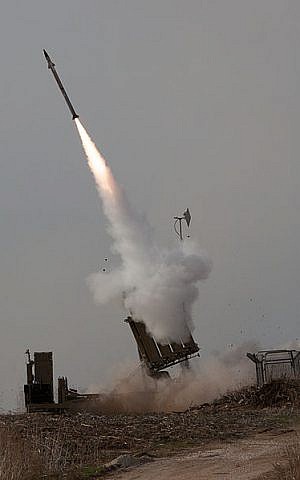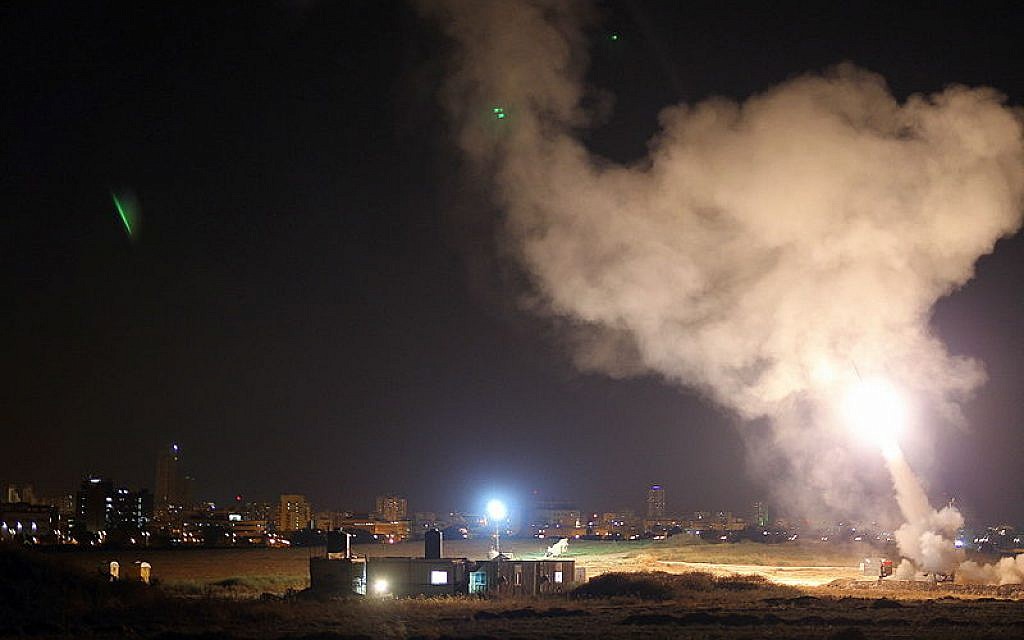Israel Strikes Back
Volleys traded between Israelis and Palestinians on Saturday killed 2 and injured 17.
In what is being called the worst daytime strike in Gaza since Operation Protective Edge in 2014, volleys traded between Israelis and Palestinians on Saturday, Shabbat, killed two and injured 14 Palestinians and three Israelis, and damaged an empty synagogue.
Starting Friday night, Palestinians fired more than 200 rockets on Israel, many of which were intercepted by the Iron Dome anti-missile defense system. The Israeli Air Force returned fire, hitting more 40 targets in the Gaza Strip, including two terror tunnels, two large logistic centers and a Hamas battalion headquarters in Beit Lahia in northern Gaza.
Before the attacks, the IDF warned civilians in the Strip to stay away from the areas they knew terror activity was taking place. After the barrage Friday night, they were told they could return to their usual routines, but the warning was reiterated after further attacks Saturday, and they were told to remain close to bomb shelters. Large gatherings of people were cancelled.
Get The AJT Newsletter by email and never miss our top stories Free Sign Up
In a release from the Government Press Office Sunday, Prime Minister Benjamin Netanyahu stated: “Over the Sabbath, we hit Hamas in a significant way and hard. Our policy is clear: Whoever hurts us, we will hit them with great strength. This is what we did yesterday. The IDF dealt Hamas the hardest blow since Operation Protective Edge. I hope that they got the message; if not, they will get it later.”
Echoing Netanyahu’s stance was Judith Varnai Shorer, Consul General of Israel to the Southeast in Atlanta. “We will not accept any attacks against us and we will respond appropriately. Currently there is a ceasefire agreed by the two sides, coordinated by Egypt. We expect it to hold. Israel said and repeats: Any breaking of the terms of the agreement which could hurt the sovereignty of Israel and civilians will not be tolerated.”

Since March, Hamas has been terrorizing Israel with weekly violent riots, incendiary kites and balloons and rockets. The riots at the security fence have increasingly become more violent.
Writing from Israel, Rabbi David Geffen, an AJT columnist and former Atlantan, asked a Knesset member and an executive with an Israel activist organization what they thought of the situation. Both agreed that Netanyahu didn’t want war. “Nothing would be gained; just young men and women killed,” the Knesset member said.
The executive agreed. “Netanyahu was not prepared to win and take over Gaza. Plus, elections are soon. Deaths could hurt him.”
Geffen’s own take on the matter was that “people who live near where the balloons are falling and burning up their crops would be most happy if Israel bombed Hamas into oblivion. The rest of the country, whoever they may be, are afraid of war to start because… they would be fighting and dying.”
Gaza is not the only border of concern, Geffen said. Syrian refugees lined up at the countries’ border Tuesday, asking to be admitted.
In his release, Netanyahu said he spoke with U.S. President Donald Trump Saturday about “security and diplomatic issues in light of developments in the region,” specifically about Syria and Iran.




comments